Chobits: Atashi Dake no Hito - Chii!
4/11/25
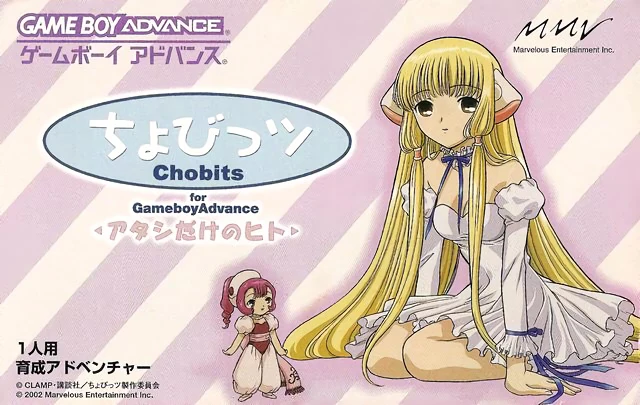
Last year, we took a look at the interesting, yet sadly basic and mediocre Love Hina Advance, as presented by Marvelous. But almost exactly a year later, Marvelous would follow this up with a successor visual novel tackling another well-loved romance series - Chobits. Whilst I enjoyed the bespoke mechanics that set Love Hina apart, the general blandness of the writing - and a nasty soft-lock - kept me from completing it. But Chobits is just an improvement in pretty much every way, both for reasons within and without the game. To speak little of the charming storytelling, more ‘dating-sim’ style of gameplay and adorable aesthetics, it manages to counter its own weaknesses. After all, a short length really isn’t an issue when there’s so much endings to explore! Visual novels and dating sims are pretty sparse across the Game Boy Advance, and I don’t think it’d be hard to say Chobits is amongst the best.
While Love Hina Advance was more of a traditional visual novel that incorporated the protagonist-bashing that’s so core to that franchise, Chobits expands on its concepts with something a little more interesting and interactable. Overall, it feels like a blend of a traditional visual novel and of the so-called “Princess Maker” genre - basically, depending on various choices and activities you partake in, you can raise various stats for Chi, which will heavily influence which ending you’ll get. With Chobits coming in at a rather short runtime of two or so hours, this stat-raising mechanic is key to experiencing more of the very cute, very sweet content that makes up this silly little visual novel hybrid.
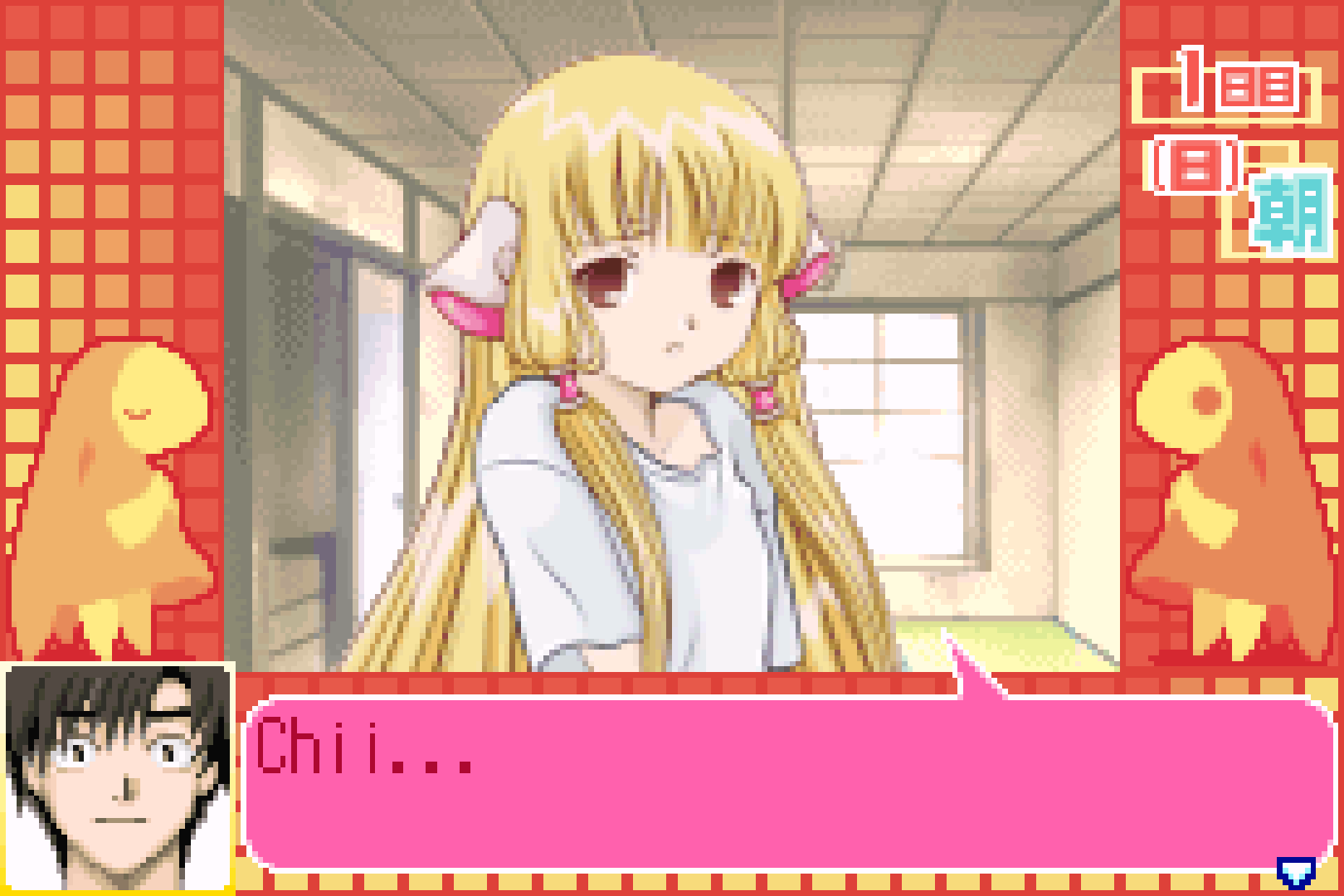
Chi's Sweet Home
The game generally seems to roughly follow the broad strokes of the source material. Hideki, a ‘ronin’ student (basically someone who has graduated school, but not gotten into a university) bemoans his inability to afford a ‘persocom’. Persocoms are a combination of PCs and, bizarrely enough, beautiful android women. Unable to afford one, Hideki stumbles upon a persocom wrapped in bandages on the sidewalk, and decides to take her home. Upon awakening, the beautiful persocom - devoid of memory, sans knowing the word “Chii” - quickly grows attached to the kind (yet wonderfully pathetic) Hideki, and their growth - be it paternal, platonic, or romantic - together begins. Chobits Advance visual novel/dating sim setting takes place over two weeks, and is largely an experience in Hideki - intentionally or not - guiding Chi through her growth, teaching her about what she’s curious about, and generally getting into all kinds of hilarious hijinks and situations with both her and his other acquaintances. Equal parts emotional and hilarious, it manages to straddle that line fantastically without overdoing it on either front. I don’t quite know how well it adheres to either the manga or the anime it’s directly adapting, but from the glimpses I’ve seen of it I think it does a good enough job. Besides, considering this is a translation that took over twenty years for a fan to eventually make, I’m sure it was pretty much a labour of love.
As you’d expect, the majority of content in the game is the visual novel style sections. The dialogue is almost sickeningly sweet, with the focus being on Chi learning about the world, her burgeoning relationships with Hideki and the others around her, and the true nature of her existence. Chi is far and away the highlight of the game - which makes sense, considering she’s literally on the screen nearly at all times - and she is *adorable*. There’s a genuine sense of development in her character as you experience more and more events. At first, she can only respond with the word “Chii”, but as the game progresses she’ll interact with Hideki and the others more. By the end, depending on the choices and growth you’ve helped Chi move through, she can become a grown, almost independent woman (regardless of robot-icity) in her own right.
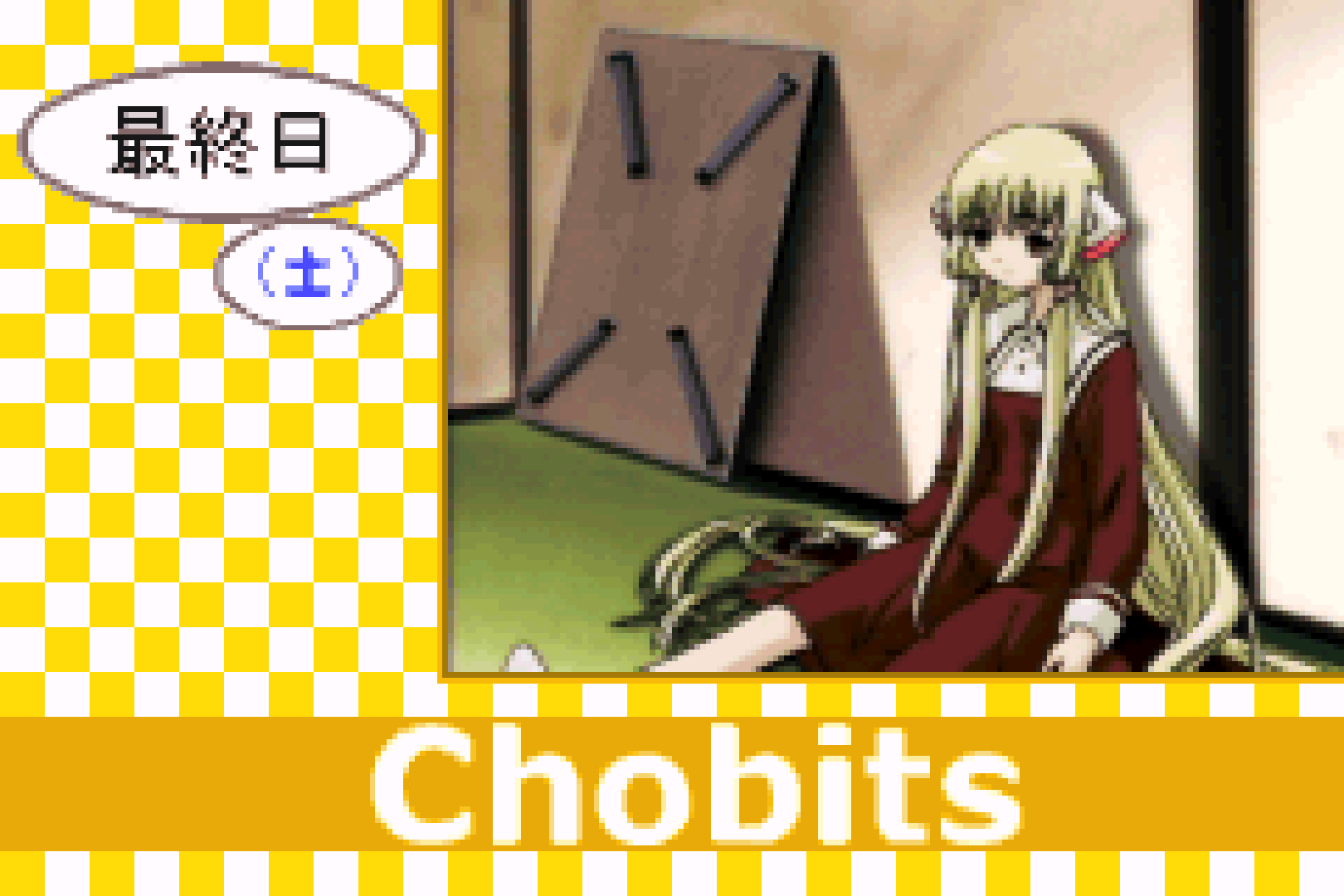
In tandem with the visual novel elements, you’ll also engage in a decent amount of ‘raising’ Chi. Sometimes, Chi will ask Hideki questions about the world or the general situation they’ve found themselves in. And, pretty uniformly, one of those options will raise one of Chi’s three major stats - intelligence, emotion, and trust. Whilst the game won’t tell you which stats are raised from these dialogue options, you can at least work out that more technical, knowledgeable questions will raise Intelligence - but trust and emotion, they kinda overlap, don’t they? Not so easy to pin down, in my opinion.
Either way, the ‘raising’ mechanic doesn’t really play much in the moment-to-moment gameplay until the very end. From what I’ve gathered, your highest stats (or perhaps the sum of them?) will dictate which endings you’ll be led towards. I just opted, in each of my playthroughs, to try and raise each of one stat, though in regards to finding a bunch of endings? Didn’t get too far, I’m afraid.
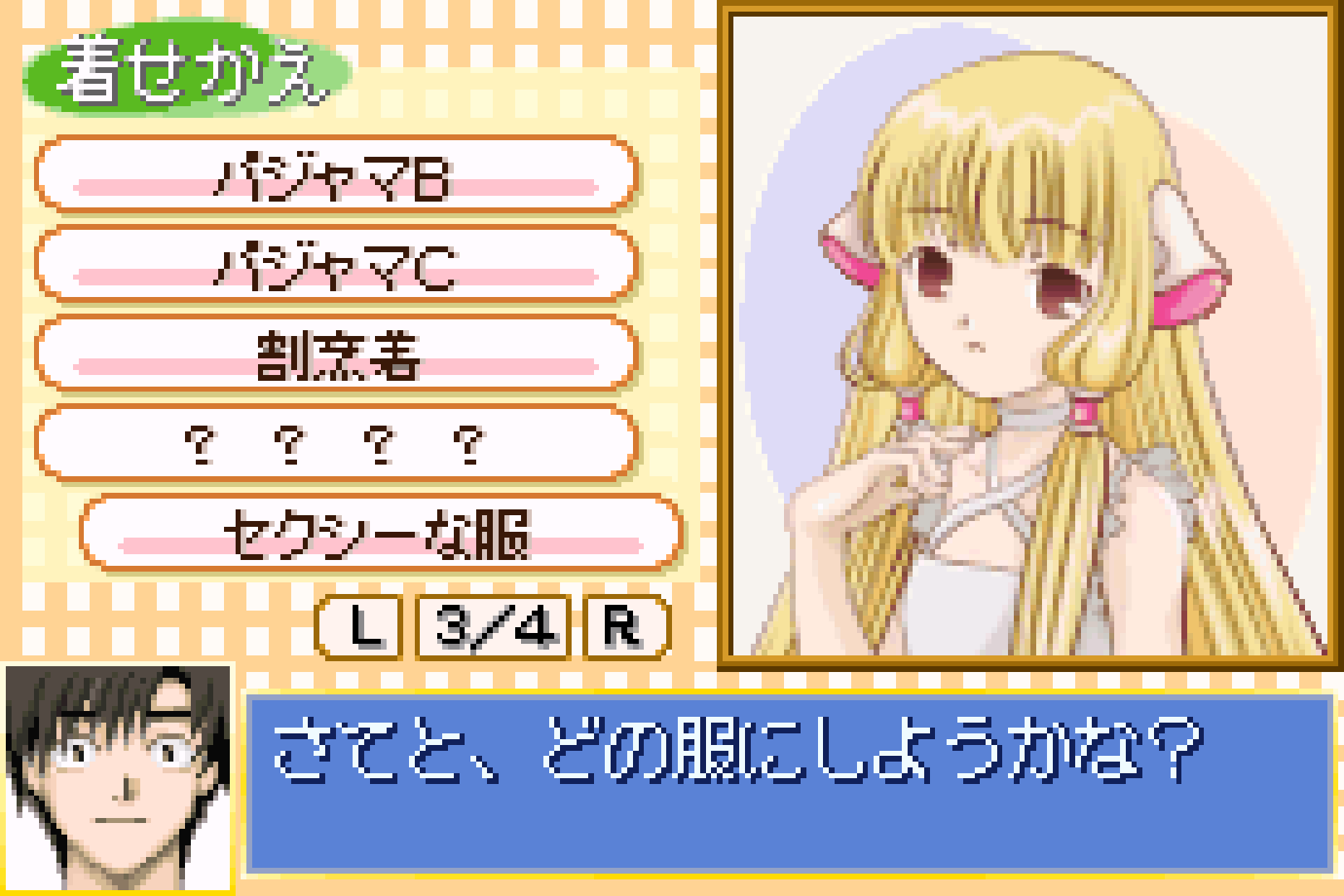
Cute Robot Girls? Cute Robot Girls.
Another little bonus that’ll satisfy both you completionists and cute robot girl enthusiasts in my audience (an audience that hopefully has decent overlap between the two) that completing certain events will reward you with new outfits for Chi! These range from the iconic (her long brown dress) to the more tantalizing (90s-esque cute girl fashion) to the more… tropey (They just have to have the old-school gym uniform, don't they?).
Either way, considering Chi is consistently on screen, having a pretty decent selection of outfits to aim for is a great benefit to trying to experience as much of the game’s pseudo-branching paths as possible. Could do with a little less of Hideki getting the vapours every time Chi gets an outfit that remotely attractive, but I’ll make do because I, too, think Chi is really, really cute. Android girls, ho!
Your main point of interaction in Chobits comes in, three times on each of the game’s fourteen days, picking where Hideki and Chi will spend their day, and thus having some control of what visual novel sequences you’ll experience. Sometimes, you’ll have the choice of multiple locales - maybe swing by the bookshop, relax in the park, or catch a meal at a restaurant. On others, Hideki (and if you play your choices right, Chi as well!) will be required to attend class or work, with Chi being looked after by one of Hideki’s friends, resulting in a frequently hilarious event once Hideki returns home. Not all locales are available to visit on each day; sometimes only two or three will have events. It’s a nice addition to the typical visual novel medium, as again, it inspires a little more replayability then something a little more linear then traditional dating sims that features multiple love interests. It’s just Chi for me, baby!

Now, with the lack of documentation of this game, there’s elements of the game that I’m a bit unclear on. In the early days, Hideki and Chi will be introduced to each of the game’s supporting cast and initiate storylines that’ll continue to follow throughout the game. Occasionally, you’ll get a call from them with an offer of spending time together on a certain day, locking you into that specific activity on that specific day. This is an assumption, but I believe since *roughly* each character has one of these events, I’m willing to bet they’ll kick off that character’s major storyline, but I can’t be sure.
But in regards to the cast themselves, they are a little tropey. You’ve got the confident, cool (chad) best friend, at odds with the uncool, loner (virgin) Hideki; the attractive, seductive teacher; the female friend who pines for Hideki; and the rich boy with a ton of sexy robot maids. There also’s Sumomo, a mini persocom gifted to Hideki by his (chad) best friend Shimbo, to help him get used to interacting with Chi, but this little fairy git can get lost. She loves to dance, but man, if I’ve ever seen an argument for contraception, it’s in Sumomo. So, Chobits is tropey. But tropey isn’t bad - it’s a story that takes that idea and gives it at all. Seriously, pretty much the whole cast are quite charming.
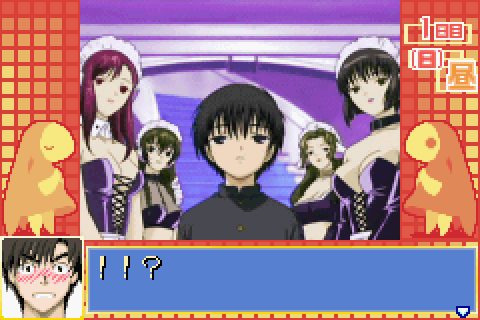
But, more importantly they exist as foils and viewpoints for Hideki to reflect on his growing relationship - paternal, platonic, or romantic - with Chi, whilst to Chi herself, they are foils for her to learn about the world and relationships Whilst I would never call the writing amazing, it’s a consistently charming, warm experience as no matter what’s going on, Chii’s reactions, visual or voiced, are ridiculously wonderful, and the way the persocom and Hideki play off one another never failed to make me smile.
In Search Of Conclusions
Following the varying storylines is one of the more frustrating elements of the game. With no guides or hints to work with, it’s pretty much a guessing game as to which activity will continue what storyline, as characters are rarely matched to a specific location. And it sucks, because a lot of these storylines are quite interesting. Minoru’s relationship with his personcom is an intriguing mystery, whilst the whole deal with Hideki’s teacher’s background was really engaging.
But in my three runs of the game, I was never able to see them fully, as I missed one event here or there, and I stopped seeing these characters in events that directly followed these tantalizing story hooks. Which sucks, because they are tantalizing! Every event gives you just enough information to leave you chomping at the bit for more, so not being able to easily follow these storylines drove me insane.

Honestly, a big problem I had with the game was trying to find specific endings. With the game having almost no documentation in the west - mostly due to the recency of its fan translation - it’s extremely hard to find details on how to actually reach each of the ten endings. As of the time of this writing, I’ve managed to shake out two endings, both of which are fairly ‘neutral’ in nature. In these, Hideki has grown closer with Chi, but his feelings haven’t really grown beyond paternal or platonic, but I haven’t had any real resolution to who Chi is, nor the big reveals as to several of the character storylines I was teased on. But, at the same time, there is a lot of fun to be had in diving into a game with so little info available online - I just wish the game had inherently a bit more internal hints as to what choices/stats/characters will get you to a new ending.
Sumomo. Or, How I Learnt To Hate Robot Girls
But at the same time, there’s one biiiiiig (well, actually small in size) issue that holds me back from wanting to constantly replay Chobits. So, I said that you need to raise Chi’s stats to influence what ending you’ll get. Well, whilst you can get stats from the correct dialouge options, the only way to consistently get the stats you want are from a certain minigame you’ll be playing A LOT of. At the start of each day, Sumomo will make Hideki’s life a living hell, requiring him to engage in a rhythm minigame that, whilst not hard, wears it’s welcome before you’re even an hour into the game. Not only that, certain events and choices will force you into doing this minigame AGAIN, albeit with the reward of a CG.
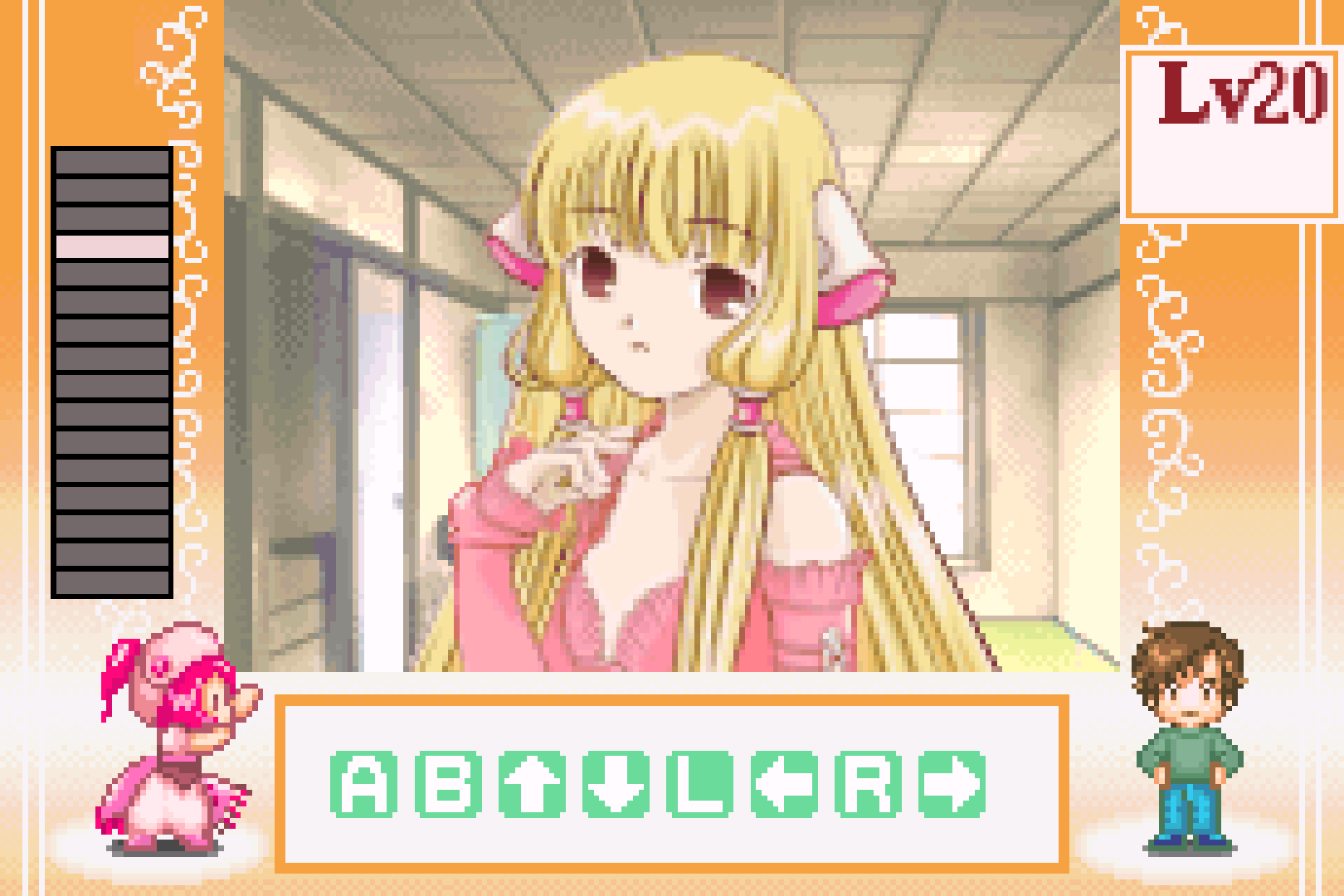
Now, you can ostensibly skip this annoying minigame in the mornings. The option is there. Ostensibly. But as I said earlier, performing well in it is the most consistent way of raising Chi’s stats. So, unless you’re just farming for CGs regardless of stats, not doing the game is like taking a shotgun to the knees as Chi’s stats are key to getting a certain ending. I can put up with a lot of the issues in this game, the repetition, the unclear requirements to hit endings - but the fact I have to do this minigame at least FIFTEEN times per run? Madness, utter, utter madness. Burn in hell Sumomo.
Sidestepping a bit, overall I feel the translation efforts of Chobits is generally quite good! The vast majority of everything important has been translated seemingly quite well - all the events, all the dialogue events, everything you’re actually playing a visual novel for. There is a decent amount left untranslated, usually in regards to more incidental dialogue. For example, the map where you select your next activity isn’t translated, but it’s pretty clear what you need to do even with it all in Japanese; everything non-translated is pretty easy to parse just from context cues and whatnot. But as someone who doesn’t read Japanese, the translation work doesn’t feel stilted or weird at any point, perfectly translating and conveying the sweet, silly charm so inherent to Chobits.
I’ll be honest, I was really taken aback by the quality of Chobits Advance. Whilst it doesn’t hold a candle to more complex visual novels, it’s a massive improvement over Love Hina, and the suite of endings and decisions you can make do a massive amount of work in leveraging its small runtime. But above all it’s just comfy, cozy, and charming from start to finish, and even as someone who hasn’t really engaged with Chobits much at all, had a damn good time. And for the fans? I’m sure they delight in it. If you’re a visual novel fan, you owe it to yourself to check this out, and support one of the newest GBA translations today!
Thanks so much for reading my review of Chobits Advance! Well, here we are. Game #99. Next up is the culmination of my original goal for the Game Boy Abyss - Game #100, which will be covering my favourite game on the system, and one of my favourites of all time. So, I’ll be taking a short hiatus as I’ll be spending a lot of time playing this one, and writing a LOT about how much it means to me. So stay tuned! I’m very excited about this one! As always, you can find me around the internet under GameBoyAbyss, and email me at mgoerge7003@hotmail.com if you have any questions or requests! Thanks again, and I’ll see you next time for game #100!
